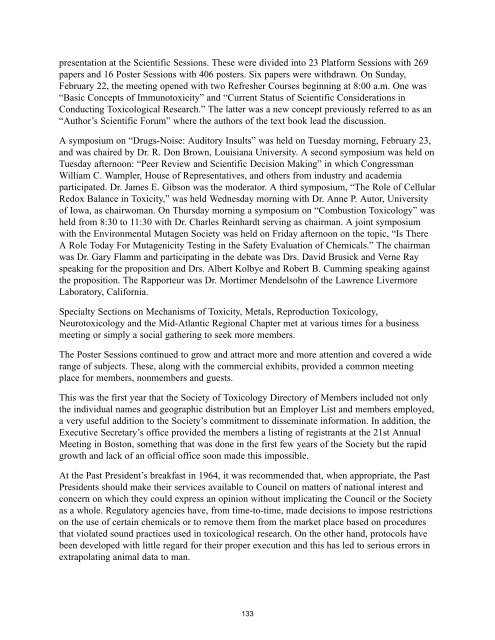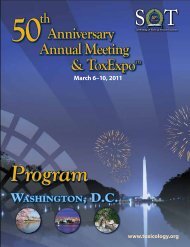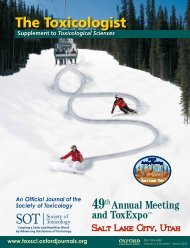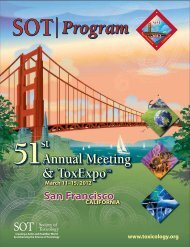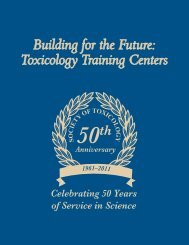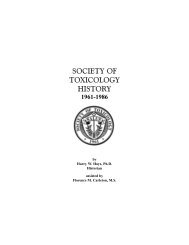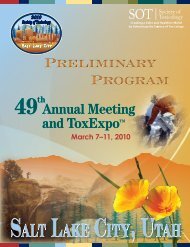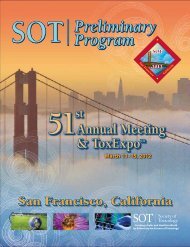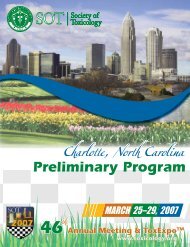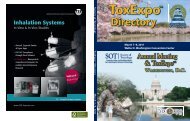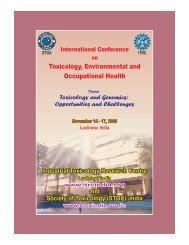SOCIETY O. TOXICOLOGY HISTORY - Society of Toxicology
SOCIETY O. TOXICOLOGY HISTORY - Society of Toxicology
SOCIETY O. TOXICOLOGY HISTORY - Society of Toxicology
Create successful ePaper yourself
Turn your PDF publications into a flip-book with our unique Google optimized e-Paper software.
presentation at the Scientific Sessions. These were divided into 23 Platform Sessions with 269<br />
papers and 16 Poster Sessions with 406 posters. Six papers were withdrawn. On Sunday,<br />
February 22, the meeting opened with two Refresher Courses beginning at 8:00 a.m. One was<br />
“Basic Concepts <strong>of</strong> Immunotoxicity” and “Current Status <strong>of</strong> Scientific Considerations in<br />
Conducting Toxicological Research.” The latter was a new concept previously referred to as an<br />
“Author’s Scientific Forum” where the authors <strong>of</strong> the text book lead the discussion.<br />
A symposium on “Drugs-Noise: Auditory Insults” was held on Tuesday morning, February 23,<br />
and was chaired by Dr. R. Don Brown, Louisiana University. A second symposium was held on<br />
Tuesday afternoon: “Peer Review and Scientific Decision Making” in which Congressman<br />
William C. Wampler, House <strong>of</strong> Representatives, and others from industry and academia<br />
participated. Dr. James E. Gibson was the moderator. A third symposium, “The Role <strong>of</strong> Cellular<br />
Redox Balance in Toxicity,” was held Wednesday morning with Dr. Anne P. Autor, University<br />
<strong>of</strong> Iowa, as chairwoman. On Thursday morning a symposium on “Combustion <strong>Toxicology</strong>” was<br />
held from 8:30 to 11:30 with Dr. Charles Reinhardt serving as chairman. A joint symposium<br />
with the Environmental Mutagen <strong>Society</strong> was held on Friday afternoon on the topic, “Is There<br />
A Role Today For Mutagenicity Testing in the Safety Evaluation <strong>of</strong> Chemicals.” The chairman<br />
was Dr. Gary Flamm and participating in the debate was Drs. David Brusick and Verne Ray<br />
speaking for the proposition and Drs. Albert Kolbye and Robert B. Cumming speaking against<br />
the proposition. The Rapporteur was Dr. Mortimer Mendelsohn <strong>of</strong> the Lawrence Livermore<br />
Laboratory, California.<br />
Specialty Sections on Mechanisms <strong>of</strong> Toxicity, Metals, Reproduction <strong>Toxicology</strong>,<br />
Neurotoxicology and the Mid-Atlantic Regional Chapter met at various times for a business<br />
meeting or simply a social gathering to seek more members.<br />
The Poster Sessions continued to grow and attract more and more attention and covered a wide<br />
range <strong>of</strong> subjects. These, along with the commercial exhibits, provided a common meeting<br />
place for members, nonmembers and guests.<br />
This was the first year that the <strong>Society</strong> <strong>of</strong> <strong>Toxicology</strong> Directory <strong>of</strong> Members included not only<br />
the individual names and geographic distribution but an Employer List and members employed,<br />
a very useful addition to the <strong>Society</strong>’s commitment to disseminate information. In addition, the<br />
Executive Secretary’s <strong>of</strong>fice provided the members a listing <strong>of</strong> registrants at the 21st Annual<br />
Meeting in Boston, something that was done in the first few years <strong>of</strong> the <strong>Society</strong> but the rapid<br />
growth and lack <strong>of</strong> an <strong>of</strong>ficial <strong>of</strong>fice soon made this impossible.<br />
At the Past President’s breakfast in 1964, it was recommended that, when appropriate, the Past<br />
Presidents should make their services available to Council on matters <strong>of</strong> national interest and<br />
concern on which they could express an opinion without implicating the Council or the <strong>Society</strong><br />
as a whole. Regulatory agencies have, from time-to-time, made decisions to impose restrictions<br />
on the use <strong>of</strong> certain chemicals or to remove them from the market place based on procedures<br />
that violated sound practices used in toxicological research. On the other hand, protocols have<br />
been developed with little regard for their proper execution and this has led to serious errors in<br />
extrapolating animal data to man.<br />
133


